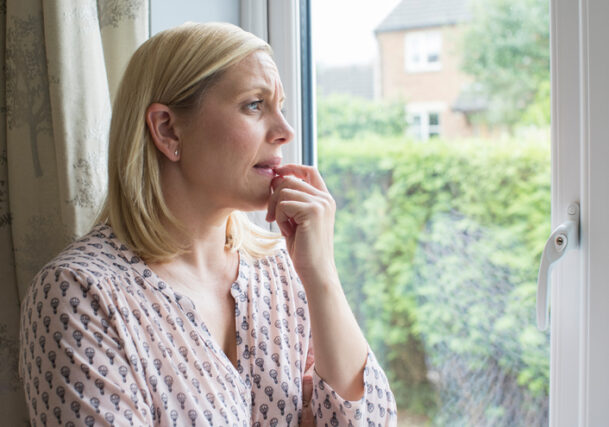Loneliness can be an overwhelming feeling, and while it’s definitely not your fault you’re experiencing it, you could be making it worse.
 Source: Unsplash
Source: Unsplash There are certain habits and behaviours you might have that heighten the feelings of disconnectedness and make it hard to feel less isolated. The good thing is that with a few changes, you’ll likely start feeling a lot better straight away. I’m not at all implying that these are solve-alls, but they can definitely help. And as usual, if you’re struggling, reach out to your GP, a mental health professional, or Samaritans (who are available 24/7/365) at 116 123.
1. You’re constantly scrolling through social media.
 Source: Unsplash
Source: Unsplash It’s tempting to turn to social media when you’re feeling lonely, but it often backfires. Endless scrolling through carefully curated highlights of other people’s lives can leave you feeling even more isolated. You’re no doubt comparing your reality to everyone else’s filtered versions, which rarely helps. Try setting limits on your social media use and focus on real-world connections instead.
2. You wait for everyone else to reach out first.
 Source: Unsplash
Source: Unsplash If you’re always on the receiving end of invitations, you might be missing out on potential connections. Taking the initiative to reach out can be daunting, but it’s often rewarding. Don’t assume people aren’t interested in spending time with you — hey might be waiting for you to make the first move. Pick up the phone, send a message, or suggest a meetup. You might be surprised by the positive responses.
3. You avoid social situations because they feel awkward.

Social interactions can feel uncomfortable, especially if you’ve been feeling lonely for a while. But avoiding them altogether only reinforces your isolation. Start small — accept an invitation to a low-key gathering or join a club related to your interests. Remember, most people feel a bit awkward in social situations at times. Pushing through that discomfort can lead to meaningful connections.
4. You don’t pursue your own interests and hobbies.

When loneliness sets in, it’s easy to lose motivation for the things you enjoy. But neglecting your passions can make you feel even more disconnected. Engaging in hobbies not only brings personal satisfaction but can also connect you with like-minded people. Whether it’s joining a book club, taking a cooking class, or participating in a sports team, pursuing your interests can open doors to new friendships.
5. You rely heavily on one person for all your social needs.
 Source: Unsplash
Source: Unsplash Putting all your social eggs in one basket can be risky. It’s great to have a close friend or partner, but relying on them exclusively for companionship can lead to disappointment and increased loneliness when they’re not available. Try to diversify your social circle. Cultivate different friendships for different aspects of your life — work friends, hobby buddies, neighbourhood acquaintances. This variety can provide a more robust support network.
6. You don’t open up to anyone about how you’re feeling.

Keeping your feelings of loneliness bottled up can make them worse. It’s natural to want to put on a brave face, but sharing your struggles with trusted friends or family members can actually strengthen your connections. Being vulnerable allows other people to understand you better and offer support. You might even find that they’ve experienced similar feelings, which can be incredibly validating.
7. You spend too much time alone at home.

While alone time can be refreshing, too much of it can feed into loneliness. Make an effort to get out of the house regularly, even if it’s just for a walk in the park or a trip to a local café. Being around other people, even without direct interaction, can help you feel more connected to the world around you. Plus, these outings increase the chances of spontaneous social encounters.
8. You turn down invites because you don’t feel up to it.

It’s easy to fall into the habit of declining invitations when you’re feeling low. But saying no too often can lead to fewer invitations in the future, creating a cycle of isolation. Try to say yes more often, even when you don’t feel entirely up for it. You might find that once you’re out, your mood lifts, and you enjoy yourself more than expected.
9. You don’t take care of your physical health.

Neglecting your physical well-being can exacerbate feelings of loneliness. Poor sleep habits, lack of exercise, and unhealthy eating can all affect your mood and energy levels, making it harder to engage socially. Focus on getting regular exercise, maintaining a balanced diet, and establishing a consistent sleep routine. Taking care of your body can boost your mood and give you more energy for social interactions.
10. You dwell on the past too much.

Replaying past social disappointments or rejections in your mind can make you hesitant to put yourself out there again. While it’s natural to remember these experiences, dwelling on them can hold you back. Try to focus on the present and future possibilities instead. Each new social interaction is a fresh opportunity, unaffected by past experiences.
11. You’re not proactive about meeting new people.

Waiting for new friendships to magically appear rarely works. Being proactive about meeting people is key to expanding your social circle. Look for local meetups, join clubs or classes, or volunteer for causes you care about. These activities put you in contact with people who share your interests, increasing the likelihood of forming meaningful connections.
12. You let your living space become cluttered and uninviting.

A messy or cluttered living space can contribute to feelings of isolation and make you less likely to invite people over. Take some time to tidy up and make your home a place you’d be happy to share with other people. A welcoming environment can boost your mood and make it easier to entertain friends, further combating loneliness.
13. You don’t ask for help when you need it.

If loneliness is significantly impacting your life, it’s important to recognise when you might benefit from additional support. That might mean talking to a friend, joining a support group, or consulting a mental health professional. Asking for help isn’t a sign of weakness; it’s a proactive step towards improving your health and developing strategies to build meaningful connections.




